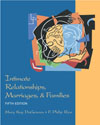Although conflict is part of every relationship and arises from various sources,
people use different methods for dealing with it. Conflict can be constructive
and destructive, in which case it can have very negative effects on children.
Most families have to adjust to various crises or drastic changes in their lives.
There are three stages in their adjustment to the crisis: onset, period of disorganization,
and reorganization. One type of family crisis involves infidelity. Involvement
in extramarital affairs occurs for a number of reasons and can be a crisis for
the single person as well as the married couple. Marriages are affected in different
ways but are most threatened by affairs that include emotional as well as sexual
involvement. Marriages can be enriched in a number of ways. Economic distress
is another type of crisis faced by many families. Associated with both physiological
and psychological distress, it has a far-reaching impact, including increased
possibility of divorce, poor communication, disharmony, and stress. Coping strategies
for economic distress are avoidance, reduced expenditures, alternative sources
of income, borrowing, and support from friends, family members, social agencies,
and others. Family violence, both verbal and physical, is a type of family crisis
that tends to perpetuate itself across generations. Either men or women can
be abusers, but due to greater size and strength, men are more likely to inflict
injury. Some male abusers seek control over their spouse/partner. Child abuse
takes the forms of attack and neglect. There are various treatment approaches
for spouse and child abuse. Incest is the most prevalent form of sexual abuse
of children, with cousin and sibling incest relationships being most common.
Intervention is difficult, partly because the problem is frequently shielded
from authorities. Death of a family member is another family crisis and is among
the most stressful of life's events. There are various circumstances of death,
with middle-aged people being most fearful, especially of uncertain death. There
are five stages of adjustment in certain death, as identified by Kübler-Ross,
and three phases of the dying process, according to Pattison. As described by
Hiltz, grief has three stages. |



 2002 McGraw-Hill Higher Education
2002 McGraw-Hill Higher Education